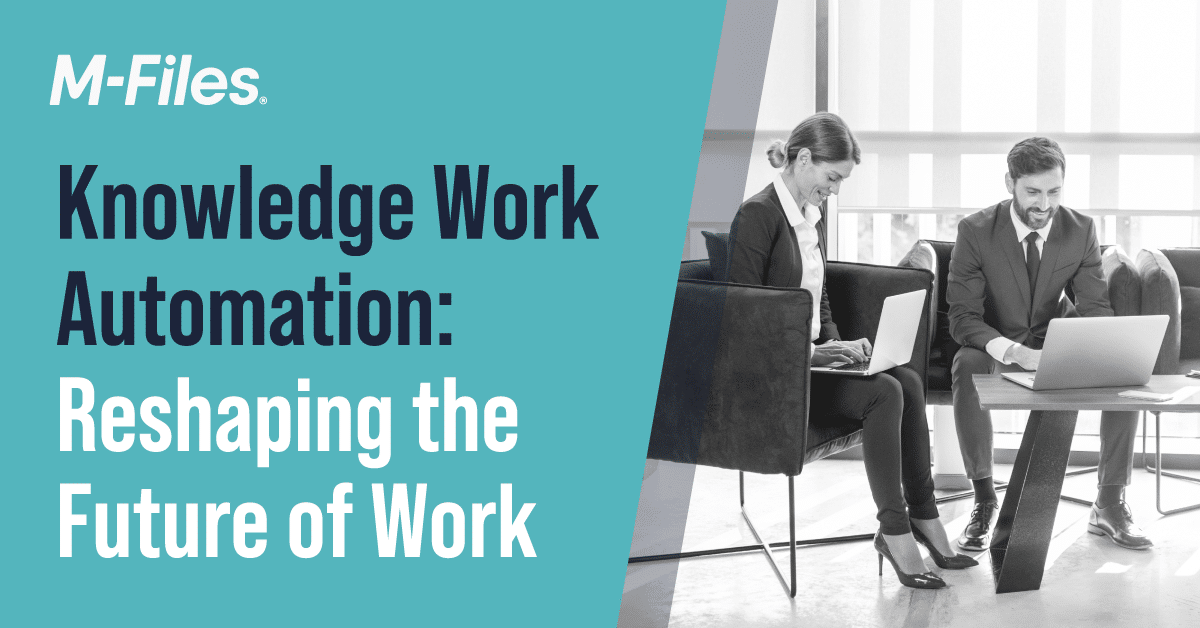Knowledge Work Automation: Reshaping the Future of Work

Knowledge work automation is emerging as a transformative force in the workplace, reshaping the way professionals engage with work tasks and boosting overall productivity. This revolutionary approach seeks to free knowledge workers from time-consuming, administrative activities, allowing them to focus on core tasks that drive improved productivity.
The Current State of Knowledge Work
Knowledge work involves tasks primarily driven by knowledge and creativity. A significant challenge arises as knowledge workers find themselves spending a substantial portion of their day on repetitive and mundane tasks.
From writing emails to ensuring legal compliance, these tasks fail to use the expertise of knowledge workers nor do they contribute to job satisfaction. A smarter way to work frees knowledge workers from these constraints and enables them to focus entirely on work that truly matters. Knowledge workers spend an alarming 41% of their day on clerical work. This translates to a staggering 3.28 billion hours daily dedicated to tasks that don’t significantly contribute to organizational success.

Knowledge Work Automation
The need for knowledge work automation becomes evident when considering the potential of using knowledge workers' time for meaningful and productive endeavors. The transformation to an automated workplace opens many new, fulfilling opportunities for workers.
Knowledge of work automation addresses efficient work management. Knowledge workers are often the architects of organizational best practices and procedures, but manual information management can be time-consuming and error prone.
Freeing workers from mundane tasks drives the quest to increase speed—the automation of business processes leaves knowledge workers with more time to focus on innovation and advances creative breakthroughs.
AI In Knowledge Management
In knowledge work automation, AI serves as a valuable tool to optimize productivity. With the right AI solution, knowledge workers can automate tasks such as data analysis, document management or summarization in multiple languages.
AI acts as a facilitator, helping knowledge workers navigate tasks more efficiently and enhancing overall productivity. The future of work for knowledge workers will see AI automation handle mundane administrative tasks, freeing up time for creative and innovative tasks.
AI and Automation
Artificial intelligence (AI) plays an important role in knowledge work automation, offering significant assistance to knowledge workers. AI, in the form of machine learning, already finds patterns in data, makes predictions, which facilitates the automation of repetitive tasks and allows knowledge workers to work smarter. In addition, generative AI not only recognizes patterns, but also creates new data that mimic patterns on which the AI has already been trained. AI will serve more as a valuable assistant that complements human capabilities rather than a threat to job security. As AI continues to evolve, it has the potential to streamline business operations and spark inspiration for knowledge workers.
Collaboration With Knowledge Work Automation
Collaboration has always been a key aspect of knowledge work. With the automation of knowledge work, collaboration becomes simple. Team members can collaborate seamlessly across various locations and time zones.
Knowledge work automation brings order to collaboration through task management. Tracking tasks ensures everyone knows the current state of a project and provides clear ownership of tasks.
Decision Automation
Knowledge work automation will elevate decision management to new heights. Automated decision support systems will analyze complex scenarios quickly and accurately.
These intelligent systems will continuously learn and adapt. The long-term result? A high-level decision-making program that, not only provides insight, but also anticipates future trends. The ability of systems to constantly learn means continual improvement.
The automation of future trends prediction will give decision makers more foresight by analyzing data. The integration of workplace automation will be a driving force in making informed, strategic decisions in real-time.
The Future of Document Control
Intelligent document creation and organization represents one of the greatest benefits of work automation. AI generates and file documents from pre-approved templates, freeing knowledge workers from time-consuming, manual tasks.
Digital document management performed by AI will make the future of work more task-focused and goal-oriented—projects will be completed faster and without the risk of error from manual work.

A Brighter Future of Knowledge
Knowledge work automation will redefine the future of work by saving time so knowledge workers can reach their full potential. Advanced technologies streamline workflows and point to a future where professionals can focus on tasks that maximize their expertise and creativity.
Knowledge work automation will change the way we work by eliminating the mundane. It's not about replacing human capabilities with machines. It's about enhancing and augmenting those capabilities by freeing up time.
The future of work will be more efficient, with AI and automation taking over repetitive administrative tasks. Emerging technologies are already finding their way into workplaces and the widespread use of automation is signaling a brighter future.
FAQ
What is working knowledge?
The understanding and awareness gained through learning, experience, and information. It includes facts, skills, and insights that individuals use for informed decision making and complex problem solving.
What is knowledge automation?
Knowledge automation is the use of technology to perform tasks that traditionally require human intelligence and decision making.
Why should we use the automation of knowledge work?
The automation of knowledge simplifies repetitive tasks and allows knowledge workers to focus on more complex problem-solving aspects of their work, leading to increased efficiency.
How should business leaders implement decision management in business processes using knowledge automation?
Business leaders should identify the important decision points in their processes and use knowledge automation. By using programs with learning abilities, they can ensure decision making becomes smarter over time.




